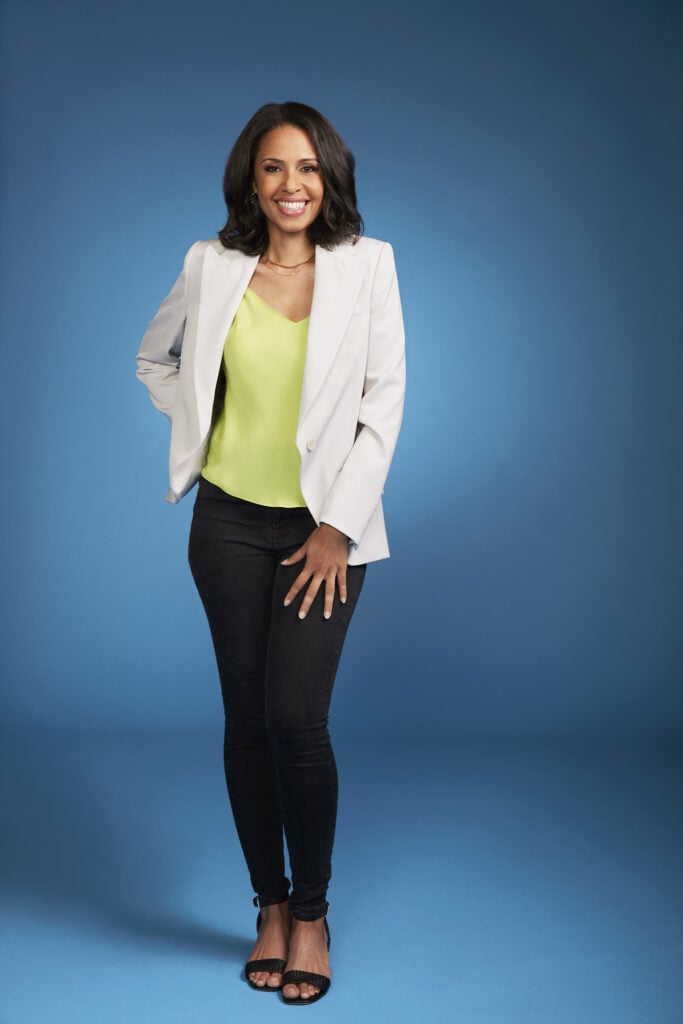Adrienne Bankert’s career spans nearly two decades of being in front of the camera, delivering hard news while connecting with millions of viewers nationwide. As an author, speaker, and national news correspondent with a 2:30 a.m. start time, the Morning in America host maintains her mental and emotional well-being by walking, writing, and cultivating meaningful human connections. All of which have proven to be therapeutic and a source to alleviate stress throughout her day-to-day.
NEW YOU chatted with the Emmy award-winning veteran journalist as she revealed her skincare secrets, the no.1 beauty tip to staying camera ready, and the importance of tapping into the inner essence of who you truly are through the power of kindness. She also gave us a crash course on understanding and managing hormonal imbalances in women.



NEW YOU: With a 2:30 a.m. start time, how do you get in the right headspace to begin your day?
Adrienne Bankert: If you look back on my career, I’ve been doing morning news for almost two decades. It’s just something where it’s a muscle; you develop the ability to get up, and you make it happen. You do what it takes, and you adjust. I go to bed close to 8:00 at night, and as long as I get six hours consistently, I’m golden.
NY: Continually covering the top news stories can affect your mental and emotional health. Although you can’t avoid stress, do you practice any consistent routines to combat stress?
AB: It’s interesting. The stories themselves don’t challenge me mentally and emotionally. I get asked all of the time, “Don’t you get upset when you see some of the content you have to deliver?”
But I can separate myself. One good practice is when you’re in work mode, you can be engaged and compassionate without being so fully invested that you are taking on the burden of the story or the subject matter. Life is stressful enough, and I can disassociate myself from thinking I have to try to solve all of the world’s problems. That’s my tip to anybody. Don’t try to solve all of the world’s problems when you’re at work, and you’ll be able to tell somebody’s story in a way people can relate to it without being burdened by it.


NY: Let’s talk about your book, Your Hidden Superpower: The Kindness That Makes You Unbeatable at Work and Connects You with Anyone. Can you tell me more about what prompted you to write this book?
AB: My business coach and mentor said, “You need to write a book that shares kindness from a different perspective.” I did not think I was kind enough to write a book on kindness, and I felt he should have written it.
I started writing down things I learned in my career. A lot of stories from Good Morning America, when I worked for that entity and then went to work for ABC News and ABC Network, I recognized it opened doors for me to be kind to people. It wasn’t necessarily my talent, especially when working with many talented people.
If you’re not careful, you’ll get into competition mode, where you will think you have to keep up with different personalities, people, or positions. That is impossible because so many people are good at what they do. I illustrate in the book that kindness is your thumbprint, which is the expression of your true essence that no one can duplicate. What the world is looking for right now is undeniable authenticity. I share kindness not just as something that is polite or appropriate to do but as something vital to being who you really are.
NY: In terms of diet, how do you maintain a healthy diet with such a busy schedule?
AB: I’ve learned with my schedule, personality, and hormones that different foods affect me differently. I try to eat organic food whenever possible and have been adamant about not eating desserts outside of a little frozen yogurt. I eat tons of fruit, so that’s kind of dessert, watermelon, mango, and things like that. I limit processed foods to once in a while, and I don’t drink caffeine at all, not even green tea, which was a doctor’s recommendation.
The biggest thing for me as a woman is knowing your hormones. Diet is great, but hormones keep you young, helps your skin, and helps your monthly mood. That, in turn, helps you with your mental health. Consider getting your hormones checked at a bioidentical hormone facility, or visit Suzanne Somers website. She has a registry of every bioidentical hormone doctor in the United States, and it’s a free resource.
NY: Thank you for sharing that with us. Let’s shift gears to discuss your skincare routine.
AB: I suggest getting a facial every month if you can. If not, Dermalogica has an excellent rice powder cleanser that can scrub your face gently. I drink lots of water, and I moisturize. When you put on moisturizer, act like you’re icing a cake. Don’t rub it into your skin; it should look like a layer of icing on your face, so when you go to bed, it soaks in throughout the night.
NY: What is your definition of beauty, and how has your perception of beauty shifted throughout the years?
AB: Beauty, for me, starts with the heart, and I’ve had to work on my heart over the years. You can be the most beautiful woman in the world but have this look of despair on your face. It’s been the people in my life who I might not have recognized how sweet their hearts were until I had a problem. They helped me to say, “Wow, they have a beautiful heart.” It’s easy to say somebody has a beautiful heart when they’re buying you lunch that day.
It’s when things aren’t as curated, when there is a moment where you need a real friend, that you see someone’s heart, and when you can see someone’s heart for who they really are. That is the most precious and beautiful person in the world. If we could all focus on healing our hearts, we’d all share more beauty with each other, and the world would be a more beautiful place.











